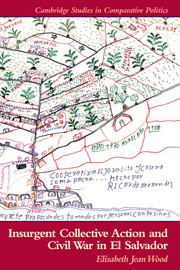Book contents
- Frontmatter
- Contents
- List of Illustrations and Tables
- Preface and Acknowledgments
- List of Abbreviations
- 1 THE PUZZLE OF INSURGENT COLLECTIVE ACTION
- 2 ETHNOGRAPHIC RESEARCH IN THE SHADOW OF CIVIL WAR
- 3 REDRAWING THE BOUNDARIES OF CLASS AND CITIZENSHIP
- 4 FROM POLITICAL MOBILIZATION TO ARMED INSURGENCY
- 5 THE POLITICAL FOUNDATIONS OF DUAL SOVEREIGNTY
- 6 THE REEMERGENCE OF CIVIL SOCIETY
- 7 CAMPESINO ACCOUNTS OF INSURGENT PARTICIPATION
- 8 EXPLAINING INSURGENT COLLECTIVE ACTION
- Epilogue: Legacies of an Agrarian Insurgency
- Appendix: A Model of High-Risk Collective Action by Subordinate Social Actors
- Chronology of El Salvador's Civil War
- References
- Index
- Other Books in the Series
2 - ETHNOGRAPHIC RESEARCH IN THE SHADOW OF CIVIL WAR
Published online by Cambridge University Press: 05 June 2012
- Frontmatter
- Contents
- List of Illustrations and Tables
- Preface and Acknowledgments
- List of Abbreviations
- 1 THE PUZZLE OF INSURGENT COLLECTIVE ACTION
- 2 ETHNOGRAPHIC RESEARCH IN THE SHADOW OF CIVIL WAR
- 3 REDRAWING THE BOUNDARIES OF CLASS AND CITIZENSHIP
- 4 FROM POLITICAL MOBILIZATION TO ARMED INSURGENCY
- 5 THE POLITICAL FOUNDATIONS OF DUAL SOVEREIGNTY
- 6 THE REEMERGENCE OF CIVIL SOCIETY
- 7 CAMPESINO ACCOUNTS OF INSURGENT PARTICIPATION
- 8 EXPLAINING INSURGENT COLLECTIVE ACTION
- Epilogue: Legacies of an Agrarian Insurgency
- Appendix: A Model of High-Risk Collective Action by Subordinate Social Actors
- Chronology of El Salvador's Civil War
- References
- Index
- Other Books in the Series
Summary
We feel a great patience. If we forget what we have suffered, it will come again. We want to press for change, we can't forget all we've suffered.
Campesina, Tenancingo, 1987We have lived the deepest truth of the war.
Cooperativist, Los Horcones, 1992To explore why some campesinos rebelled in contested areas of El Salvador before and during the civil war, my principal research strategy was to ask participants in the insurgency why they supported it, and to ask others why they did not. For revolutionary social movements, this is not usually done; the scholarly analysis of peasant rebellions, revolutions, civil wars, and even some social movements often relies on official or elite sources. In particular, as Nancy Bermeo (1986) and Nora Kriger (1992) argue, the study of peasant insurgency often relies not on the accounts of peasants themselves but on the memoirs of elite revolutionary leaders who are usually from a different class or on macro level data. One reason of course is that peasant actors are often illiterate or semi-literate and leave few written accounts of their actions, although oral sources in the form of stories and songs may be very rich. Participant accounts, be they elite memoirs, the few biographies of peasant participants available (which were often dictated to journalists or other literate interlocutors), or other accounts based on oral histories, rarely address social science concerns of how representative the narrator is or whether alternative accounts better explain available evidence.
- Type
- Chapter
- Information
- Insurgent Collective Action and Civil War in El Salvador , pp. 31 - 50Publisher: Cambridge University PressPrint publication year: 2003



